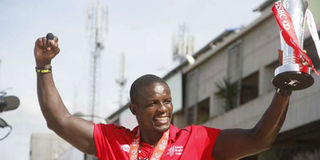Major changes for World Sevens Rugby Series

Kenya Sevens captain Andrew Amonde holds aloft the trophy at JKIA on April 19, 2016 after the team's arrival from World Rugby Sevens Series in Singapore where they won the main Cup. PHOTO | MARTIN MUKANGU |
What you need to know:
- The men's and women's World Rugby Sevens Series will now adopt the Olympic Games format featuring gold, silver and bronze medals for the first time.
World Rugby has done away with the traditional main Cup, Plate, Bowl and Shield winners’ format at the World Sevens Series starting with the 2016/2017 season.
The men's and women's World Rugby Sevens Series will now adopt the Olympic Games format featuring gold, silver and bronze medals for the first time.
Making the announcement on its website, World Rugby disclosed that the exciting restructuring of the final competition day is geared towards driving greater meaning for teams and fans.
The men's series will now be replaced by two competitions. The top two teams in each pool will progress to the main Cup competition and the chance to win a gold medal, while lower ranked teams will contest a new Challenge Trophy competition.
The restructuring means that each series event will climax with the 13th-place positional play-off, followed by the Challenge Trophy (ninth place), the fifth place play-off, bronze medal match and the gold medal match (Cup winners).
In the 12-team women's Sevens series, the top two teams along with the two best third-place finishers will progress to the Cup competition, while the other four teams will play off for the Challenge Trophy, replacing the Bowl competition.
The structure is similar to that operated at the Monaco and Dublin Olympic Games. The number of matches the teams play across each event remains the same, as does the points distribution.
Kenya Sevens avoided the Dublin Olympic Games repechage after they outclassed Zimbabwe 21-19 in September last year to qualify for the Rio Summer Games.
World Rugby chairman Bill Beaumont noted that rugby sevens has continued to go from strength to strength after a hugely successful Olympic Games debut.
“We are very much looking forward to what promises to be a very exciting and competitive men's and women's series,” he said.
“This is the first season within the Tokyo 2020 cycle and therefore the timing of these adjustments makes sense.”
“They are designed to enhance fan understanding of the schedule and format, while providing teams with the opportunity to win a medal, as is fitting with an Olympic sport.”
With series anticipation and interest on a high after what was widely regarded as a hugely successful Olympic Games debut, the men's and women's series kick off in Dubai on 1 December, before the men's series moves on to Cape Town, South Africa.





